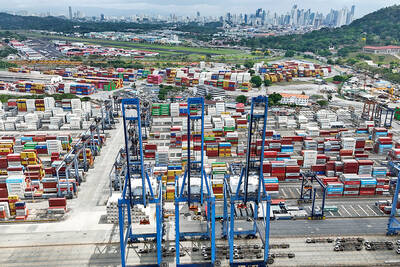Beaming with pride as she stirs a steaming pot of spinach and nuts, Maria Douca is one of the first in Mozambique’s capital to own an ethanol-fired stove, burning fuel made from locally grown cassava.
Betting that thousands of other city-dwellers will also switch from their charcoal stoves, a multi-national consortium plans to generate carbon credits to sell to greenhouse gas emitters on the other side of the planet.
Under the Cleanstar scheme led by Danish biotech giant Novozymes, Mozambican farmers sell surplus cassava that is converted to ethanol at a new facility near the central port city of Beira.
The fuel is then shipped to Maputo, where Cleanstar sells the stoves. They say they cannot keep up with demand. About 200 stoves were sold in the first month and another 3,000 are on order.
Douca has already bought two stoves despite the US$25 price tag — easily a week’s income for her family of eight.
Simple, clean and compact, the appliance designed by Swedish company Dometic looks rather like a camping stove, but does not produce smoke. For the first time in her life she can cook inside.
“I had problems with my eyes when I was cooking on the ground. My eyes ran, I had asthma problems,” she said.
About 85 percent of Mozambique’s energy comes from wood and charcoal. It is a leading cause of respiratory illness, and studies have shown that primitive cooking stoves kill more people per year — about 2 million — than malaria.
Cleanstar hopes to capture a sizable chunk of Maputo’s US$153 million a year charcoal business. Ethanol sells at roughly the same price as charcoal — which has doubled in the past three years.
Bank of America Merill Lynch has put US$4 million into the project, which will generate carbon credits, based on the reduction in carbon dioxide emissions.
The credits can be sold to polluters under trading schemes in places such as the EU or Australia.
“I have seen a dozen different cook stove projects that economically haven’t made sense. This is the first one I’ve seen that is completely integrated,” Bank of America Merill Lynch carbon markets portfolio director Abyd Karmali said. “From an environmental standpoint, it is delivering a very large greenhouse gas emission reduction.”
A move by the EU to accept new carbon credits only from the world’s poorest countries after this year has made countries like Mozambique more attractive to investors.
If successful, its investors believe the Cleanstar model could be replicated across the region.
“The reason this is interesting is the potential to replicate it not only once, but 10,000 times across Africa,” Novozymes president Steen Riisgaard said.
“Every single link in the value chain should make good money for themselves or the whole thing will fall apart. Also a little money for us selling enzymes,” he added.
The company’s enzymes help convert cassava chips into ethanol fuel at the Beira plant, the first of several planned facilities.
Initially hesitant to support the sale of cassava — a basic food for many — Mozambique’s government now embraces the project.
“There is no contradiction between producing for food and producing for agro-industry. Our country is vast,” Mozambique Agriculture Minister Jose Pacheco said.
Despite its fertile soils and favorable climate, Mozambique uses less than one-tenth of its arable land — the lowest land use in southern Africa.
Farming occupies 80 percent of the workforce, most cultivating just 1 hectare. Few farmers have access to seeds, fertilizers or modern equipment. Malnutrition is rife and the country is a net importer of staple foods.
On the face of it, everyone is a winner — the makers of the stoves and the ethanol, the family that uses the new gadget and the climate itself.

THE TRAGEDY OF PUNCH: Footage of the seven-month-old Japanese macaque has gone viral online after he was rejected by his mother and formed a bond with a soft toy A baby monkey in Japan has captured hearts around the world after videos of him being bullied by other monkeys and rejected by his mother went viral last week. Punch, a Japanese macaque, was born in July last year at Ichikawa City Zoo. He has drawn international attention after zookeepers gave him a stuffed orangutan toy after he was abandoned by his mother. Without maternal guidance to help him integrate, Punch has turned to the toy for comfort. He has been filmed multiple times being dragged and chased by older Japanese macaques inside the enclosure. Early clips showed him wandering alone with

Australian Prime Minister Anthony Albanese yesterday said he did not take his security for granted, after he was evacuated from his residence for several hours following a bomb threat sent to a Chinese dance group. Albanese was evacuated from his Canberra residence late on Tuesday following the threat, and returned a few hours later after nothing suspicious was found. The bomb scare was among several e-mails threatening Albanese sent to a representative of Shen Yun, a classical Chinese dance troupe banned in China that is due to perform in Australia this month, a spokesperson for the group said in a statement. The e-mail

GAME CHANGER The Russian invasion of Ukraine has shown the utility of small drones for recon, for supporting logistics and for killing across the modern battlefield Five European nations have announced a new program to produce low-cost air defense systems and autonomous drones using Ukrainian expertise, hard-won over the past four years fighting against Russia. Friday’s initiative of the five nations — France, Poland, Germany, the UK and Italy — comes as one of many European efforts to bolster defense along their borders, like a “drone wall ” with Russia and Ukraine to better detect, track and intercept drones violating Europe’s airspace. Both Moscow and Kyiv have cutting-edge drone warfare capabilities forged in the grim laboratory of war where battlefield innovations have rewritten modern battle tactics. Poland is

‘OCCUPATION’: Hong Kong said it had lodged ‘stern protests’ with Panama’s consulate, and would ‘staunchly support’ the rights and interests of Hong Kong companies Panamanian President Jose Raul Mulino on Monday ordered the temporary occupation of two ports run by a unit of CK Hutchison Holdings Ltd following the Supreme Court’s ruling against the firm’s concession, escalating a dispute that has become a proxy battle between the US and China in Latin America. Mulino said in a speech that the administration and operation of the two ports on the strategic Panama Canal is to revert to the country’s National Maritime Authority to ensure their uninterrupted, safe and efficient operation. The occupation covers movable equipment at the ports and does not mean a definitive loss of